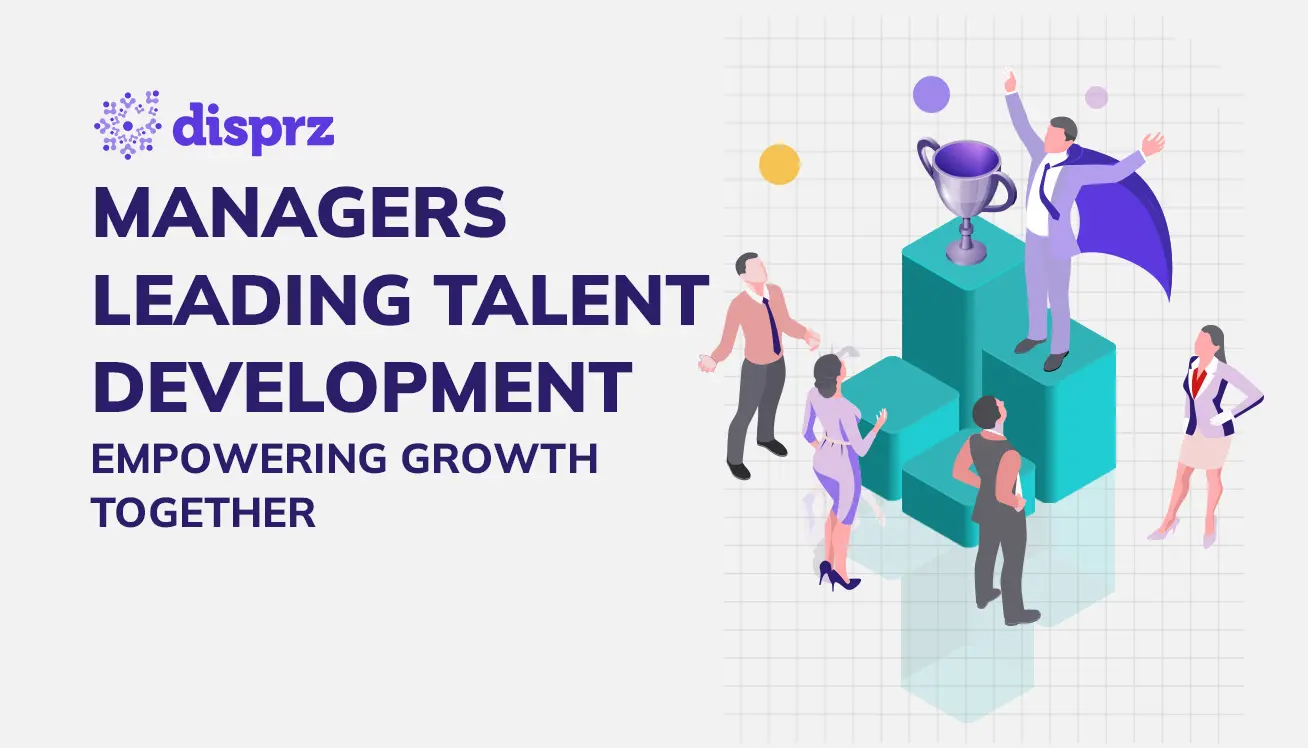
6 min read
• 12 Apr 2024
Achieve Effective Retail Management Through Manager Upskilling
Want to ensure your retail company is managed effectively? Discover 8 store manager skills that lead to effective retail management in 2024 with Disprz.
-
eBookEmployee Upskilling - A Detailed Blueprint For Building A Skills-Driven Learning Culture
The retail industry has undergone a massive change in the last few years. The rise in online shopping has increased the importance of providing the customer with a holistic shopping experience making retail management a must. In fact, 86% of buyers will pay more for a great customer experience. But how can you expect a leader to be effective without the right retail store manager skills?
A successful customer experience can only be achieved through efficient retail management, ensuring order in your store and top performance of your employees. Unfortunately, many retail stores do not have employees equipped with the store managers skills needed for the job.
What is Retail Management?
Retail management is a list of steps that facilitates the functioning of the retail store. From ensuring that a buyer chooses your store to sending every customer out of the store satisfied, all falls under the purview of retail management.
A retail manager must wear multiple hats and acquire many store manager skills. This can include keeping track of the store’s inventory and products. Honing certain manager skills can prevent the store from missing out on sales by guaranteeing every aspect of retail management is successful.
Key Challenges in Retail Management
A retail manager has to deal with several challenges in the workplace, especially as the industry becomes more fast-paced and competitive. Some of the most common retail management challenges include:
Job Complexity
Retail managers are expected to fulfill multiple tasks while ensuring their team executes its’ duties well. The complexity of their job leads to long working hours and increased levels of stress.
High Employee Turnover
The retail industry’s high employee turnover rate only adds to the challenges faced in retail management. In addition to performing a complex role, retail managers must regularly hire and train new employees to combat the high turnover. Their retail management style must minimize the number of employees leaving the job to combat this challenge.
Constant Industry Evolvement
The constantly evolving nature of the retail industry means a retail store has to keep rebranding itself. This proves challenging for the retail manager, who has to understand, change customer trends, and modify the store accordingly.
Inadequate Retail Management Experience
Retail managers also often have inadequate experience. In fact, less than 27% of managers have between 5-9 years of experience, and around 26% have between 10-19 years of experience. This means retail managers need additional training from time to time. They must cultivate a broad set of store manager skills and refine them regularly for effective retail management.
8 Key Manager Skills for Successful Retail Management in 2024
Here are a few store manager skills needed to lead a retail team on the path of growth.
1. Multitasking
As highlighted earlier, a retail manager has to don multiple hats in their job. Thus, they need to be able to multitask to complete their work on time. They should be able to assist and supervise their team while not letting their work suffer. To multitask efficiently, managers must begin the day by creating a list of tasks. This can give them an idea about what tasks can be grouped and finished together.
2. Time management
Along with multitasking, it is also crucial for retail store managers to efficiently divide their time. They should understand the high-priority tasks and what can be delegated to others. They should set clear goals regarding how much work must be completed during the day and block time slots for each task in their list. They should also know how to eliminate distractions and handle interruptions, not only for themselves but also for their teams.
3. Decision making
Retail management requires managers to make several decisions during the day. These decisions need to be made quickly and often times the manager must make a well-informed decision on the spot. Decision making is one of the most important store manager skills that a retail leader can have.
4. Leadership abilities
This is one of the most crucial traits that a retail manager should possess. It is imperative to learn not just how to manage your team but also how to lead them. This will allow a manager to maximize their team’s productivity and help them achieve their full potential.
Being a good leader requires developing several interpersonal skills like people management and problem-solving. These retail store manager skills enable a good leader to facilitate their team to manage themselves, thus saving time and resources.
5. Organizational skills
Managers need to cultivate organizational skills to ensure the store’s efficient management. In the fast-changing landscape of the retail industry, these store manager skills are becoming increasingly important as they can facilitate rebranding the store. Organizational skills can also help you manage tight schedules and budgets, identify your store’s problems, cut costs, and boost sales.
6. Effective and impactful communication
Effective retail management requires the manager communicate efficiently with their team to ensure that there is no miscommunication. A manager needs to have good listening skills to resolve employee and customer issues.
7. Motivational skills
Developing motivational skills can help retail store managers inspire their employees to work harder and be more productive. Managers should learn how to provide constructive criticism and feedback to their employees to learn from their mistakes. An inspiring manager can also increase a worker’s job satisfaction and prevent them from quitting their job.
8. Efficient customer service
Providing efficient customer service should be a manager’s top priority. To do this, a manager needs to understand customers’ needs, behavior, and preferences. They should be able to assist a customer satisfactorily and train their employees to do so as well. Providing efficient customer service ensures that buyers will return to the store and improve sales for your business.
For the development of these retail manager skills, every manager must receive proper training. Though this can be done in many ways, providing a personalized learning pathway is often the most beneficial.
A personalized learning pathway is a learner-centric approach that is customized to cater to a particular individual. Such an approach facilitates learning as it identifies a learner’s goals, interests, talents, and weaknesses and teaches them according to their learning style. Thus, it can engage learners and help them learn faster. disprz’s AI-powered platform can help you create personalized learning modules for managers and other employees. It formulates exciting and stimulating content that promotes functional and behavioral advancement. It also ensures that knowledge and skills learned are retained by reinforcing learning through short, daily tasks.
Conclusion
Retail management training is the key to your retail business’ success. A good retail manager enhances the overall performance of all of the stores’ employees, thus maximizing productivity. They can reduce losses by preventing waste of time and other resources; and promoting sales by ensuring good customer service. Their role is becoming increasingly important as the retail market continues to grow and evolve in 2024.
Retail stores need to make digital investments to grow and instill health and safety measures to ensure that their customers visit brick-and-mortar establishments. Only an effective retail store manager can guarantee the adequate implementation of these changes and identify new areas where profitability can be increased.
About the author

disprz speaks
"Disprz Speaks" is the authoritative voice of Disprz, a prominent ecosystem dedicated to advancing enterprise skilling and learning. Our mission is to be your go-to resource for enlightening you with cutting-edge industry trends, narrate inspiring success stories, and provide valuable insights and strategies to empower your organization in today's dynamic business landscape.
More Resources
4 min read
• 15 Apr 2024
Unlocking the Power of Managerial Engagement in Talent Development
4 min read
• 09 Apr 2024
Nurturing Excellence in Building Leadership Pipelines
Sign up to get free resources and stay up to date with Disprz!
Discover how Disprz can align learning and upskilling with your desired business outcomes.





